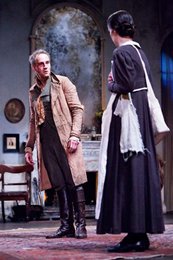Consider these ingredients for drama: a crumbling big house in the Irish countryside ca. 1822. Financial desperation on the part of the widowed lady of the house, extreme enough to prompt marrying off her only daughter in England. Increasingly impoverished and restive tenants. A spirit presence in the house to which the daughter is attuned. A defrocked priest sent to convey the daughter to her marriage. His sidekick, addicted to laudanum and Hegel. Bonkers granny. Gun introduced in the first act. Onstage séance. Maid in love with estate manager. Estate manager in love with lady of the house. Lady of the house in denial of her love of estate manager. Reeling yet?
Indeed Conor McPherson has packed so many recognizable elements of genre, plot, character, and theme into his first new play in five years that one wonders if this might have been intended as a Big House parody. But it’s McPherson’s own straight-faced production that eventually seems to communicate that we are meant to take all this seriously, pace some nice moments of comedy in the first act.
.jpg.aspx%3Fwidth=260&height=173) The production’s initial impact is strong, thanks to a truly stunning set design by Rae Smith: a soaring drawing room resplendent in its functional decay, with a missing ceiling allowing the branches of a huge tree to loom over the playing area. Early scenes, though burdened with extensive spoken exposition, clearly set up the situation; and the cast playing the household – Bríd Brennan as the lively housekeeper, Caoilfhionn Dunne as the emigration-minded maid, and particularly Peter McDonald as the lovestruck estate manager Fingal – give rock-solid, empathetic performances. Fenella Woolgar also convinces as Lady Madeline, forced by her situation to make difficult decisions on her daughter’s behalf; and Emily Taaffe as the quivering, acute Hannah fully invites audiences to believe she is wired into existence on a more heightened level than most mortals.
The production’s initial impact is strong, thanks to a truly stunning set design by Rae Smith: a soaring drawing room resplendent in its functional decay, with a missing ceiling allowing the branches of a huge tree to loom over the playing area. Early scenes, though burdened with extensive spoken exposition, clearly set up the situation; and the cast playing the household – Bríd Brennan as the lively housekeeper, Caoilfhionn Dunne as the emigration-minded maid, and particularly Peter McDonald as the lovestruck estate manager Fingal – give rock-solid, empathetic performances. Fenella Woolgar also convinces as Lady Madeline, forced by her situation to make difficult decisions on her daughter’s behalf; and Emily Taaffe as the quivering, acute Hannah fully invites audiences to believe she is wired into existence on a more heightened level than most mortals.
But credulity, and patience, start to wear thin as the visitors appear: Jim Norton plays it very broad indeed as the fruitily loquacious Reverend Berkeley, and Adrian Schiller is laboured with some long and abstracted passages as the tagalong Audelle. What McPherson appears to be attempting with this character – and the play as a whole – is to marry his ongoing fascination with ghosts and the allure of ghost stories (so brilliantly realized in The Weir) with his interest in philosophy, which he studied at UCD. This element of the production does not feel fully worked out and integrated into the other storylines, however. A secret that finds its way to the surface is that Madeline’s husband hung himself in this very drawing room and Hannah found the body; she now is visited by that spirit, which Berkeley and Audelle try to access via the séance. But this does not fully seem to connect with ideas about the mind-body connection Audelle spouts (and which are outlined in a  programme note about German idealism). Nor is this material clearly tied into the seam of postcolonial fury that erupts in the second act via Fingal, seemingly out of nowhere: there may be a line to be drawn between British land ownership and spiritual possession (rather than a civil war, Ireland needed one big exorcism?) but it is not fully articulated. And by that point, two and a half hours in, so many layers of plot and genre had been laid on top of each other that audience members were mostly in a woozy state of information overload. McDonald, in any event, accomplishes something truly remarkable in making this 11th hour speech come across as emotionally plausible, given that he is made to speak both plot and subtext together in a way that leaves nothing to the audience’s imagination.
programme note about German idealism). Nor is this material clearly tied into the seam of postcolonial fury that erupts in the second act via Fingal, seemingly out of nowhere: there may be a line to be drawn between British land ownership and spiritual possession (rather than a civil war, Ireland needed one big exorcism?) but it is not fully articulated. And by that point, two and a half hours in, so many layers of plot and genre had been laid on top of each other that audience members were mostly in a woozy state of information overload. McDonald, in any event, accomplishes something truly remarkable in making this 11th hour speech come across as emotionally plausible, given that he is made to speak both plot and subtext together in a way that leaves nothing to the audience’s imagination.
Clearly, McPherson was trying something new here with his first major historical play, and that’s impressive given how much success he has enjoyed dramatizing the contemporary. But the script is several drafts away from being stageable, and having the author as its director meant one less outside eye in the process. This raises questions about the choices behind this production, which ends up feeling like quite a letdown for National Theatre audiences used to a higher standard of dramaturgy than is on evidence here.
Karen Fricker lectures in contemporary theatre at Royal Holloway, University of London and deputy London theatre critic for Variety (US).